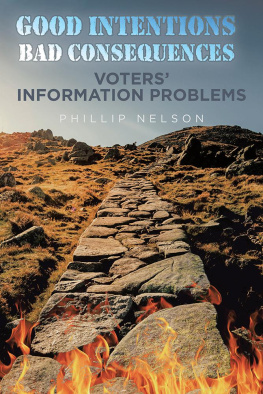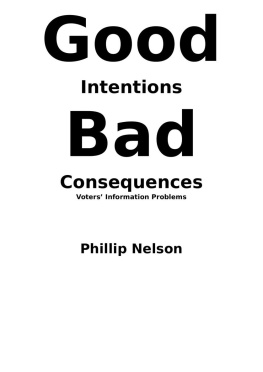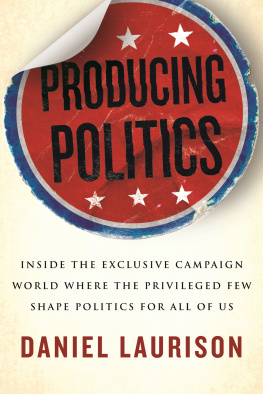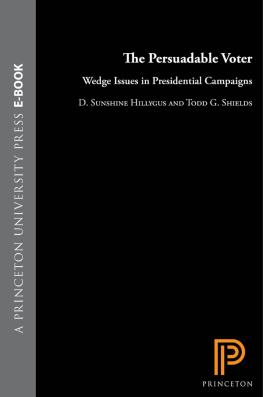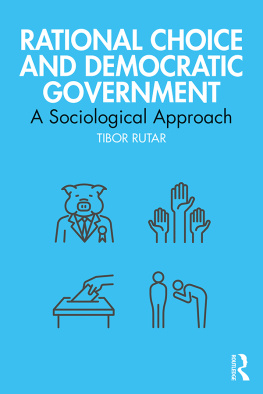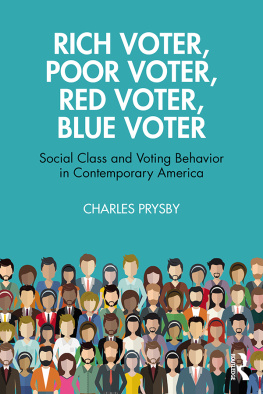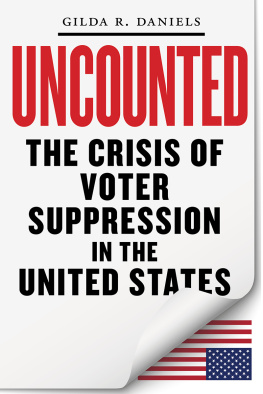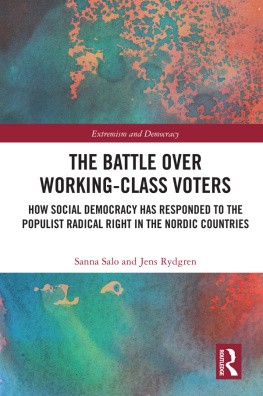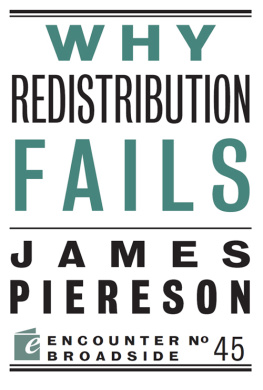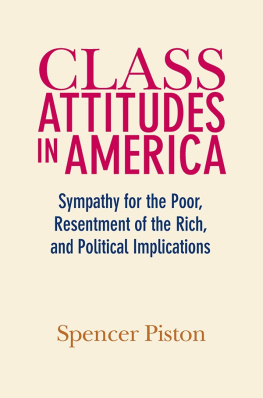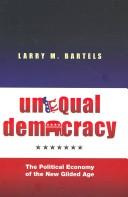GOOD INTENTIONS
Bad Consequences
VOTERS INFORMATION PROBLEMS
PHILLIP NELSON

AuthorHouse
1663 Liberty Drive
Bloomington, IN 47403
www.authorhouse.com
Phone: 1 (800) 839-8640
2017 Phillip Nelson. All rights reserved.
No part of this book may be reproduced, stored in a retrieval system, or transmitted by any means without the written permission of the author.
Published by AuthorHouse 07/20/2017
ISBN: 978-1-5246-7379-6 (sc)
ISBN: 978-1-5246-7380-2 (hc)
ISBN: 978-1-5246-7378-9 (e)
Library of Congress Control Number: 2017903164
Any people depicted in stock imagery provided by Thinkstock are models,
and such images are being used for illustrative purposes only.
Certain stock imagery Thinkstock.
Because of the dynamic nature of the Internet, any web addresses or links contained in this book may have changed since publication and may no longer be valid. The views expressed in this work are solely those of the author and do not necessarily reflect the views of the publisher, and the publisher hereby disclaims any responsibility for them.
CONTENTS
APPENDIX
Status
APPENDIX
Unintended Consequences
CHAPTER 1
OVERVIEW
P olitical scientists have written extensively about voters lack of information, but they have ignored one of the most important voter information problems: lack of information about the consequences of the policies they advocate. This problem is particularly severe among voters who want to do good but are uninformed about essential features of their attempts to do so. It is the information problems of that group of voters that generates the main distinction between what voters intend and the consequences these intentions produce.
The disagreement between liberals and conservatives about economic policy is focused on two questions. Should governments spend more directly and indirectly on protecting the environment? Should governments redistribute more income to the poor and away from the wealthy? Answers to these questions are of more than passing interest to social scientists and citizens alike.
In logic these answers require a comparison of what is and what is better, and some feasible path to get toward the latter from the former. Better information is the path advocated in this book. It is feasible because it does not require voters to acquire more information than they have incentives to acquire, just better information, which need not be more expensive information.
For the most part, the economics literature has used a simple self-interest model to explain political choices, and certain features of political preferences are consistent with that model such as the direct relationship between income and votes for Republicans. But that is not the whole story, and this book focuses on the rest of the story. Both self-interest and altruism affect voter decisions. However, both of these motivations will be somewhat muted because they both focus on the policy consequences of voting. Any individual voter has a negligible effect on those consequences because his vote has a negligible impact on voting outcomes. In contrast, voters are primarily interested in others reaction to their vote and how they view themselves, largely a function of others potential reactions. As a result, self-interest does not play the dominant role in determining political decisions that it plays in determining market decisions. The political position of limousine liberals is the most obvious deviation from the income determinant of political choice by way of self-interest. Indeed, Nelson and Greene (2003) found that self-interest variables were less important than other variables in determining political positions. But still self-interest plays a role in voter choice, just not the overwhelming role it plays in market decisions.
The reason self-interest and altruism affect voter decisions at all is that voter preferences are simply extensions of the preferences they express in conversation, and people do talk about their self-interested preferences and their notions of what is good for the world and their country. These latter notions of what is good are often influenced by self-interest, but not always. That the individual voter has a negligible effect on voting outcomes has another important effect. Voters, for the most part, have little self-interested incentive to acquire much information about the consequences of government policy. To the extent they have any political information at all, it is a consumption good. The usual way of determining how much political information voters have is finding how many political facts they know. Even by this standard, many voters are ill informed. But there is an equally important political knowledge componentknowledge of the consequences of policies. As I try to show in this book, many voters are also ill informed with respect to this component. Many of the voters who know their political facts are woefully deficient in their knowledge of policy consequences, and this has profound effects on their voting behavior.
One such effect is a certain erratic nature of voting outcomes. There are multiple motivations in voting. The motivation that dominates voting at any one time can vary. Occasionally xenophobia dominates. Hitlers election, the Know Nothing party in the United States and Donald Trump are examples of this phenomenon. Their success is also attributable to a disgust with stalemates sometimes produced by representative democracy. But, for the most part other reasons for voting are at the fore.
The divide in the electorate on which I concentrate is between two groups. One group includes those who vote in a self-interested way, those who are traditionalists, and those who vote the same way as the first two because they imitate their vote. The other group is those voting altruistically in a particular way and those whose vote imitates the former. I call that way liberal altruism and I call the above bifurcation the great divide.
Liberal altruistic voters advocate more government expenditures for the same causes for which most people give to charities with one notable exception religious causes. Liberal altruistic voters advocate more government expenditures for the sick, the poor, the environment, education, etc., all charitable causes The rationale for calling this a form of altruism is that the objects of charity are determined by an altruistic process. Charities survive only if they respond to at least some peoples view of some social need not satisfied by self-interested actions. The reason the charity for religious purposes is not included in liberal altruism is that liberals are relatively unreligious.
As detailed in this book, there is a good deal of evidence that there is an innate altruistic preference. But there are serious problems with liberal altruistic voting. Currently, people cannot observe directly many of the consequences of their actions and the list of liberal altruistic actions has grown considerably. Now people have to acquire their information indirectly about those consequences. That indirectness creates a serious bias, the well-known confirmation bias. People tend to look for information that confirms their current views and avoid contrary information. Liberal altruistic voters have no incentive to acquire information that would call into question their political preferences, sustained as they are by the political preferences of their liberal altruistic friends. In consequence, liberal altruistic voters tend to continue to be liberal altruistic voters in spite of a good deal of evidence that they ignore. The most important ignored consequences of their agenda are the unintended consequences of their actions. That is the justification for calling liberal altruistic voters nave.
Next page
